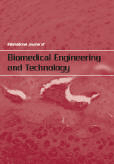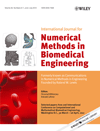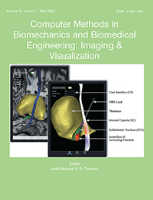
Biocybernetics and Biomedical Engineering
Scope & Guideline
Leading the Charge in Biocybernetic Research
Introduction
Aims and Scopes
- Biomedical Signal Processing:
The journal emphasizes the analysis and interpretation of biological signals, such as EEG, ECG, and EMG, utilizing advanced signal processing techniques and machine learning algorithms. - Medical Imaging and Diagnostics:
Research in this area focuses on the development and enhancement of imaging technologies, including MRI, CT, and ultrasound, aimed at improving diagnostic accuracy and image analysis through automated methods. - Wearable and Implantable Technologies:
The journal covers innovations in wearable devices and implantable systems that monitor physiological parameters, enhancing patient care through real-time data acquisition and analysis. - Modeling and Simulation in Biomedical Systems:
This area includes computational modeling and simulations of biological processes, which help in understanding complex physiological phenomena and in designing medical devices. - Artificial Intelligence in Healthcare:
A significant focus is on the application of AI and machine learning techniques to improve clinical decision-making, predictive analytics, and personalized medicine. - Bioinformatics and Data Analysis:
Research includes the application of statistical and computational methods to analyze biological data, facilitating insights into health and disease.
Trending and Emerging
- AI and Machine Learning Applications:
An increasing number of papers are exploring the use of AI and machine learning for diagnostics, predictive modeling, and personalized medicine, indicating a trend towards leveraging computational intelligence in healthcare. - Telemedicine and Remote Monitoring:
Research focusing on telehealth technologies and remote patient monitoring systems is on the rise, driven by the growing demand for accessible healthcare solutions and the impact of global health challenges. - Multimodal Physiological Sensing:
There is a growing interest in integrating data from multiple physiological sensors to provide comprehensive health assessments, reflecting a trend towards holistic health monitoring. - Advanced Image Processing Techniques:
Emerging themes include the use of sophisticated image processing and analysis techniques to improve diagnostic capabilities and automate image segmentation and classification. - Bioinformatics and Genomic Data Analysis:
The journal is increasingly publishing research that applies bioinformatics tools to genomic and proteomic data, highlighting the importance of data science in understanding complex biological systems.
Declining or Waning
- Traditional Biomedical Engineering Techniques:
There is a noticeable decrease in publications focused solely on conventional biomedical engineering methods, as newer, more integrated approaches emerge that incorporate advanced computational techniques and AI. - Basic Biological Studies:
Research emphasizing purely biological studies without technological or engineering integration has become less frequent, suggesting a transition towards more interdisciplinary work. - Static and Non-Interactive Systems:
There has been a decline in studies related to static medical devices that do not incorporate interactive or adaptive features, as the field moves towards dynamic, responsive systems.
Similar Journals

ANNALS OF BIOMEDICAL ENGINEERING
Elevating biomedical engineering to new heights.ANNALS OF BIOMEDICAL ENGINEERING is a premier journal in the field of biomedical engineering, published by Springer. Established in 1972, this journal has become a vital resource for researchers, professionals, and students engaged in the rapidly evolving domain of biomedical technology. With a commendable impact factor and ranked in the 76th percentile among its peers as per Scopus, it exemplifies excellence in disseminating critical research findings. The journal covers a broad scope of topics related to the integration of engineering principles with medical and biological sciences, facilitating innovations that enhance healthcare outcomes. Although open access is not offered in this journal, it remains an essential platform for scholarly communication, contributing to the continuous advancement of knowledge in biomedical engineering. ANNALS OF BIOMEDICAL ENGINEERING is not only a bridge for academics to share groundbreaking research but also an influential guide for practical applications in medicine and health technologies, making it a fundamental publication for its readership.

BIOMEDICAL ENGINEERING-APPLICATIONS BASIS COMMUNICATIONS
Bridging technology and medicine for a healthier world.BIOMEDICAL ENGINEERING-APPLICATIONS BASIS COMMUNICATIONS is a prominent journal dedicated to the dynamic field of biomedical engineering, published by WORLD SCIENTIFIC PUBL CO PTE LTD. Since its inception in 1992, the journal has provided a platform for the dissemination of high-quality research and innovative applications within the biomedical engineering domain. Despite its current Q4 ranking in multiple categories such as Bioengineering and Biomedical Engineering, the journal serves as an essential resource for researchers and professionals seeking to explore the latest developments and practical applications in this interdisciplinary field. The journal is based in Singapore, reflecting the region's growing influence in scientific research and technology. Although it does not offer open access, it continues to attract submissions that enrich the scientific dialogue within its community. With a commitment to fostering knowledge and research collaboration, this journal remains a vital contributor to the ongoing advancements in biomedical technology and engineering.

Cardiovascular Engineering and Technology
Driving Innovation in Cardiovascular TechnologiesCardiovascular Engineering and Technology, published by SPRINGER, stands as a prominent journal in the fields of Biomedical Engineering and Cardiology. With an ISSN of 1869-408X, this journal bridges the gap between engineering innovation and cardiovascular health by exploring the latest advancements pertinent to cardiovascular technologies and therapies. The journal, currently in its converged years from 2010 to 2024, holds important positions in Quartile 3 of both Biomedical Engineering and Cardiology and Cardiovascular Medicine categories, highlighting its relevance and influence in these domains. Ranked in the 59th percentile for Cardiology and 42nd percentile for Biomedical Engineering, the journal is a valuable resource for researchers, professionals, and students keen on understanding the intersection of engineering solutions and cardiovascular medicine. Although the journal is not open access, it remains highly regarded for its rigorous peer-reviewed content that contributes to the advancement of technology in the cardiovascular field.

Biomedical Signal Processing and Control
Advancing biomedical innovation through signal mastery.Biomedical Signal Processing and Control is a premier academic journal published by ELSEVIER SCI LTD that stands at the forefront of the rapidly evolving fields of biomedical engineering, health informatics, and signal processing. With an impressive impact factor reflecting its scholarly influence and high standards of research, this journal has been recognized in the Q1 quartile category across multiple disciplines as of 2023. Specifically, it holds esteemed positions within Biomedical Engineering, Health Informatics, and Signal Processing, where it ranks in the top tier of its field on Scopus: #19/131, #21/138, and #47/303 respectively. Published continually from 2006 to 2024, the journal serves as a critical platform for researchers, healthcare professionals, and students, fostering innovation in signal processing techniques and their applications in biomedical systems. Access to cutting-edge research and methodologies makes it an indispensable resource for advancing knowledge and practice within these interdisciplinary domains.

International Journal of Biomedical Engineering and Technology
Exploring the Intersection of Engineering and MedicineThe International Journal of Biomedical Engineering and Technology, published by INDERSCIENCE ENTERPRISES LTD, serves as a pivotal platform for the dissemination of innovative research in the field of biomedical engineering. This journal, with ISSN 1752-6418 and E-ISSN 1752-6426, has been a valuable resource since its inception in 2007, boasting a converged publication timeline extending to 2024. Based in the United Kingdom, the journal aims to bridge the gap between engineering and biomedical sciences, facilitating interdisciplinary collaboration. As reflected in its 2023 Scopus ranking in the Q4 quartile of Biomedical Engineering, the journal remains accessible for researchers at various stages of their careers, contributing to its significance in promoting advancements in healthcare technologies. While currently not an open-access publication, the journal remains dedicated to enriching the biomedical engineering community by presenting novel research that addresses critical challenges, ultimately aiming to improve patient outcomes and drive innovation in medical devices and therapies.

International Journal for Numerical Methods in Biomedical Engineering
Exploring the Intersection of Engineering and MedicineInternational Journal for Numerical Methods in Biomedical Engineering is a premier peer-reviewed journal dedicated to promoting advancements in numerical methods and their applications in the biomedical engineering field. Published by WILEY and based in the United States, this journal serves as a vital platform for disseminating innovative research from 2010 to 2024, with a focus on bridging the gap between computational techniques and real-world biomedical challenges. With an impressive impact factor and categorized in the Q2 quartile across several fields including Applied Mathematics and Biomedical Engineering, it ranks among the top journals in its domain. The journal provides free access to its content, making it an invaluable resource for researchers, professionals, and students eager to explore groundbreaking methodologies. By fostering interdisciplinary collaboration and showcasing high-quality research, International Journal for Numerical Methods in Biomedical Engineering plays a crucial role in advancing our understanding of complex biomedical systems through numerical analysis.

Biomedical Engineering Letters
Transforming healthcare through cutting-edge research.Biomedical Engineering Letters, published by SpringerNature, is a prominent journal in the field of Biomedical Engineering. With a robust ISSN of 2093-9868 and E-ISSN of 2093-985X, this esteemed journal has established itself as a vital resource for researchers and professionals seeking to advance their knowledge and share groundbreaking findings. Recognized for its quality, Biomedical Engineering Letters holds a distinguished ranking in Scopus, positioned at #94/303 (69th percentile) in the Biomedical Engineering category. The journal covers a diverse scope within biomedical engineering, providing an important platform for innovative research from 2011 to 2024 and facilitating the exchange of ideas among scholars. Although it operates under a subscription model, the journal's commitment to enhancing the field makes it an indispensable reference for those engaged in cutting-edge biomedical research in Germany and globally.

Progress in Biomedical Engineering
Bridging disciplines to revolutionize healthcare outcomes.Progress in Biomedical Engineering, published by IOP Publishing Ltd, is a premier open-access journal that serves as a vital platform for the dissemination of innovative research in the field of biomedical engineering. With an impressive Q1 classification in the Biomedical Engineering category for 2023, this journal has established itself as a significant contributor to the advancement of engineering solutions that improve healthcare outcomes. Recognized for its high-quality and impactful publications, it ranks 51st out of 303 in its field on Scopus, placing it in the 83rd percentile. The journal aims to foster interdisciplinary collaboration and introduce pioneering methodologies and technologies that bridge the gap between engineering and medicine. By providing a pathway for rapid communication of fundamental and applied research, Progress in Biomedical Engineering is dedicated to shaping the future of healthcare technology. Access to its content ensures that researchers, professionals, and students remain at the forefront of biomedical innovation.

Computer Methods in Biomechanics and Biomedical Engineering-Imaging and Visualization
Empowering Biomedical Innovations with Computational MethodsComputer Methods in Biomechanics and Biomedical Engineering - Imaging and Visualization is a prominent academic journal published by Taylor & Francis Ltd, dedicated to the intersection of computational methods and biomedical engineering. With an ISSN of 2168-1163 and an E-ISSN of 2168-1171, the journal has become a crucial resource for researchers and professionals exploring innovative imaging and visualization techniques in healthcare. Covering a broad spectrum of topics, it aims to facilitate the advancement of knowledge in areas such as biomechanics, computational mechanics, and medical imaging. Holding a strong position in various Scopus rankings, including Q2 in Computational Mechanics, it offers valuable insights that foster interdisciplinary collaboration. Although it is not an open-access journal, researchers can access its rich repository of knowledge, which is instrumental in shaping future advancements in biomedical applications. The journal’s commitment to quality and relevance ensures that it remains an authoritative source for emerging trends and methodologies within the field, serving as a vital tool for academia and industry practitioners alike.

Journal of Mechanics in Medicine and Biology
Transforming Medical Technologies through Mechanical ResearchThe Journal of Mechanics in Medicine and Biology, published by World Scientific Publishing Co Pte Ltd, serves as a critical platform for interdisciplinary research at the intersection of engineering and biomedical sciences. With an ISSN of 0219-5194 and E-ISSN of 1793-6810, this esteemed journal has been dedicated to exploring the mechanical principles that govern biological systems since its inception in 2008. Based in Singapore, it addresses a diverse range of topics, from biomaterials to biomechanics, contributing valuable insights into the field’s evolving landscape. Although currently positioned in Q4 of Biomedical Engineering according to the 2023 category quartiles, it is poised for growth and increased visibility within the scientific community, fostering innovation and collaboration among researchers, professionals, and students alike. The journal emphasizes the importance of cutting-edge research and its practical implications, making it a vital resource for those striving to enhance the future of medical technologies and biological understanding.